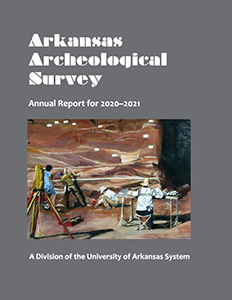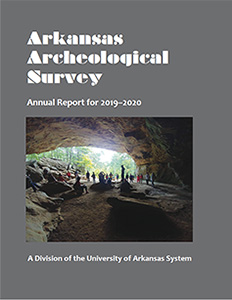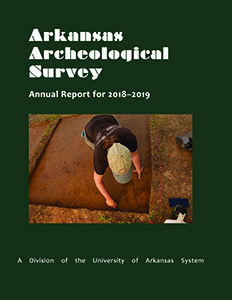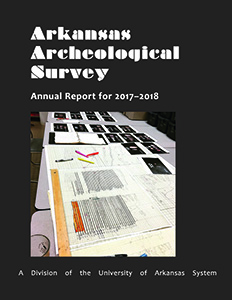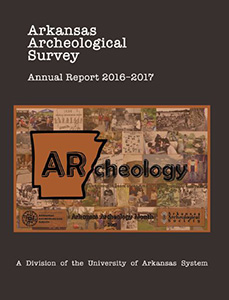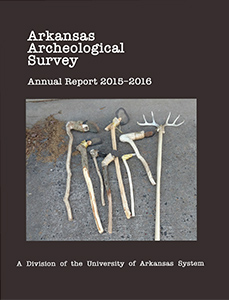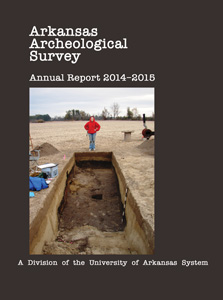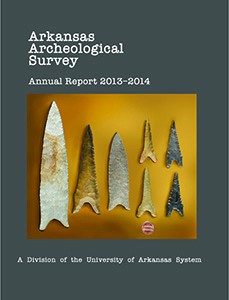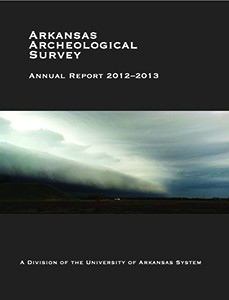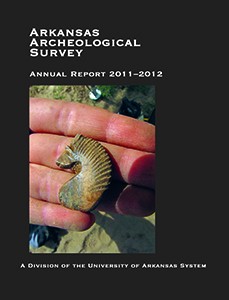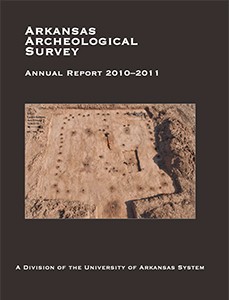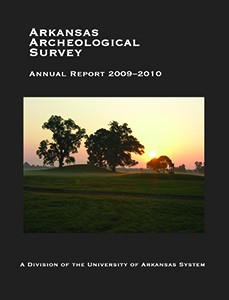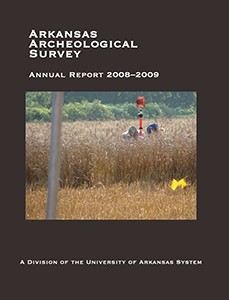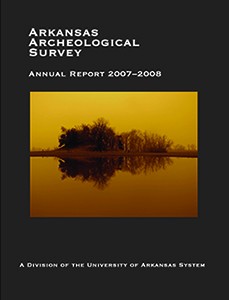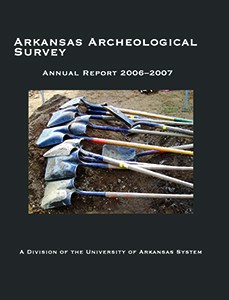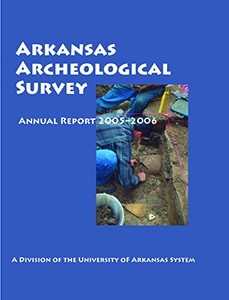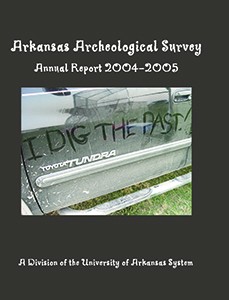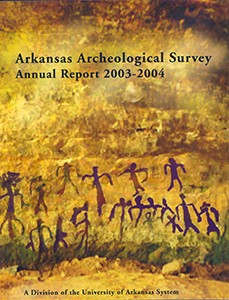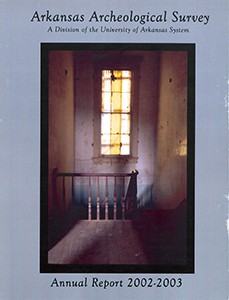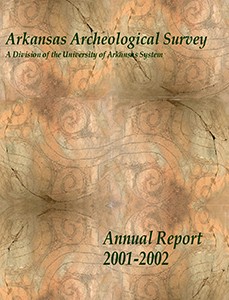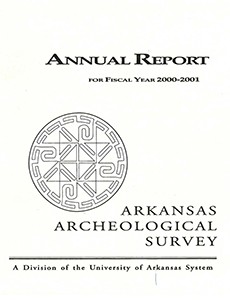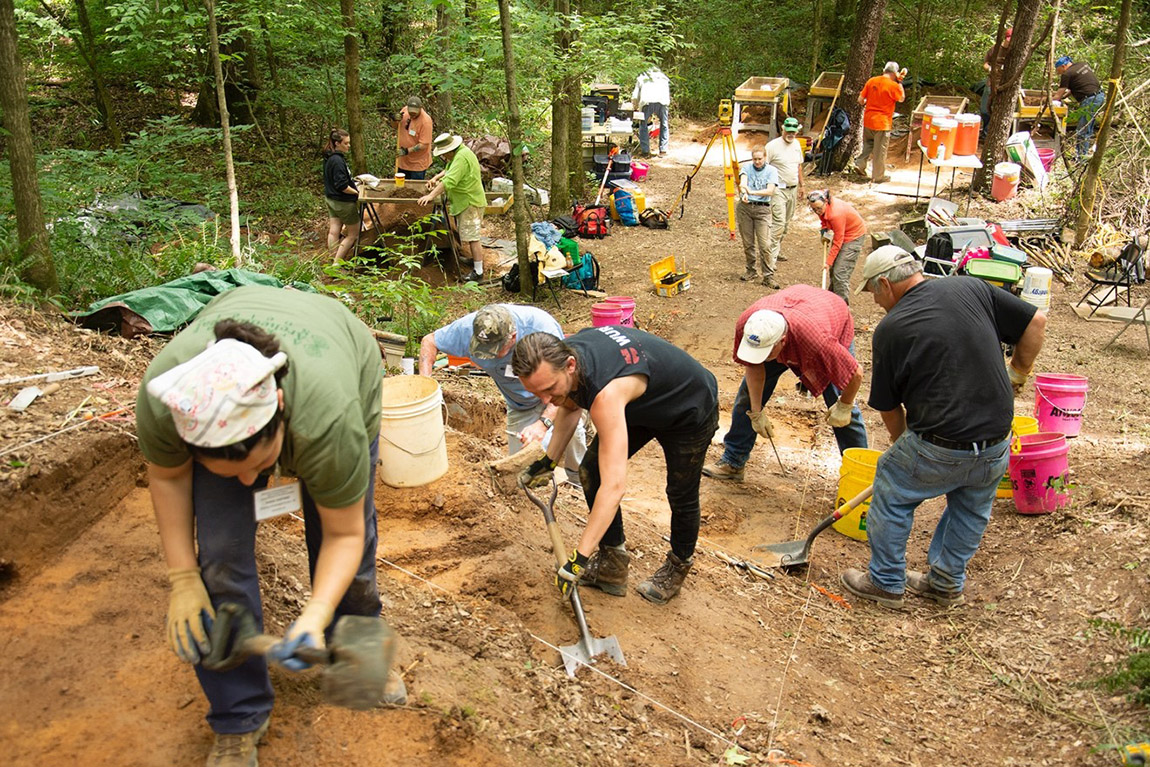
Over 50 Years of Science and Service
The Arkansas Archeological Survey (ARAS) is a part of the University of Arkansas System. Our mission is to study and protect archaeological sites in Arkansas, to preserve and manage information and collections from those sites, and to communicate what we learn to the people of Arkansas. We have ten research stations around the state, located on seven university campuses, two state parks, and at the UA System’s Winthrop Rockefeller Institute. Survey archaeologists help to increase our knowledge of Arkansas by working closely with local, state, and federal agencies, American Indian tribes, college students, school teachers and K-12 students, tourists, fellow scholars, landowners and managers, amateur archaeologists, and all Arkansas residents interested in archaeology, prehistory, and the early history of the state. These are some highlights of our accomplishments in 2020–2021.
Meeting the Challenges of 2020–2021
Workday Transition. In July 2020, following a two-year period of development, the cloud-based Workday system of integrated human resource and financial management software applications “went live” for the first cohort of University of Arkansas System institutions. Workday is used to manage all business processes for UA System employees.
Covid-19. As one of numerous institutions of higher education in Arkansas, the ARAS administration continued to work closely with the UA System Office, the Arkansas Division of Higher Education, the Arkansas Department of Health, and the University of Arkansas for Medical Sciences to monitor Covid-19 cases within and across the institutions; provide support for affected faculty, staff, and students; assist in contact tracing programs; and support vaccine initiatives. At our coordinating office and research stations, staff adopted work protocols and schedules to ensure maximum protection against the risk of infection.
Annual Reports Archive
Annual reports for past years are accessible at the end of this page.
Save
Save
Virtual Public Archeology and Teaching. As part of our adoption of safe and physically distanced work practices this year, ARAS staff devoted considerable time to the creation of innovative and successful virtual presentations for a wide range of audiences including the avocational archaeology community, members of the general public interested in all aspects of Arkansas history, and the public education community who frequently turn to us for resources that can be adapted to classroom settings. Our PhD staff who hold teaching positions at campuses across the state adapted their coursework for implementation on the variety of platforms adopted at their host institutions.
Scientific Achievements & Archeological Mission 2020-2021
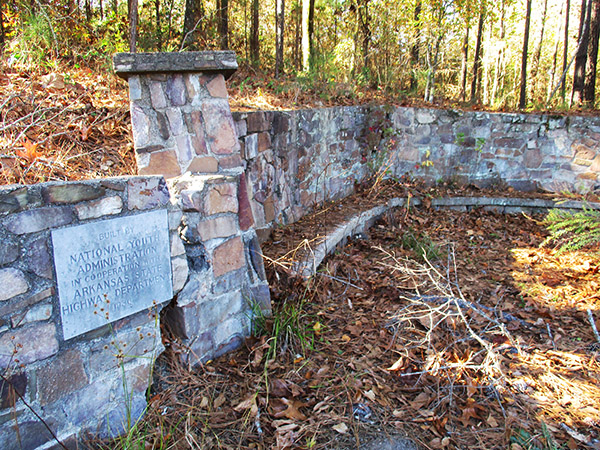
Publications and Presentations. ARAS staff authored or coauthored 37 print or digital publications and reports and presented 30 papers or posters at meetings and conferences in 2020–2021.
Records Management. Our AMASDA database (Automated Management of Archaeological Site Data in Arkansas) is one of the oldest and best computerized site file systems in the country. Our computer services program and registrar’s office personnel are constantly working to expand and upgrade the AMASDA system to add new functionality. The system is now available online (password protected) for qualified researchers. Contractors may subscribe per project or for an annual fee.
-
281 new archaeological sites were recorded, bringing the total number of sites in Arkansas site files to 50,443.
-
263 new archaeological projects were entered into the database, bringing the projects total to 7,803.
Help for Researchers. The Survey registrar facilitated requests for information from the Arkansas site files by students, researchers, and project managers. This included 12 graduate student and academic research projects. We assisted local, state, and federal entities, five American Indian Tribes, and 45 private firms conducting projects in Arkansas.
Outside Funding. We conducted projects supported with new funds generated by grants and cost-share agreements totaling $75,116.80.
Volunteers. Despite curtailment of in-person opportunities and the annual June Training Program due to Covid-19, volunteer participation in our projects totaled 697.5 hours, showing a high level of interest in archaeology.
ARAS Publications Program. Our publications program continues to develop with two new Popular Series volumes (No. 7 and No. 8) and one new Research Series volume (No. 70) published in 2020–2021. We have additional submissions to Research Series and Popular Series under review.
-
Thanks to cooperative effort with the University of Arkansas’s CashNet team, our program now has an online eCommerce storefront, linked from our main website, where individual customers can order books. Online sales were shut down for several months during the pandemic.
Projects Around Arkansas
Safe Field Schools. Emily Beahm (ARAS-WRI) and Carl Drexler (ARAS-SAU) were coauthors of the paper, “Improving Equity, Access, and Professionalism at Archaeological Field Schools Through the Prevention and Reduction of Sexual Harassment and Assault,” presented at the 86th Annual Meeting of the Society for American Archaeology Presidential Session on April 15, 2021. The two are co-principal investigators on a $300,000 grant from the National Science Foundation led by Carol Colaninno-Meeks (Southern Illinois University Edwardsville STEM Center) and Shawn Lambert (Mississippi State University). This multiyear research project is aimed at making archaeological field schools safer and more inclusive for all students. It will ultimately benefit not only field schools but all archaeological fieldwork contexts, as well as other field-based disciplines, and will improve the overall quality of archaeological research for the future.
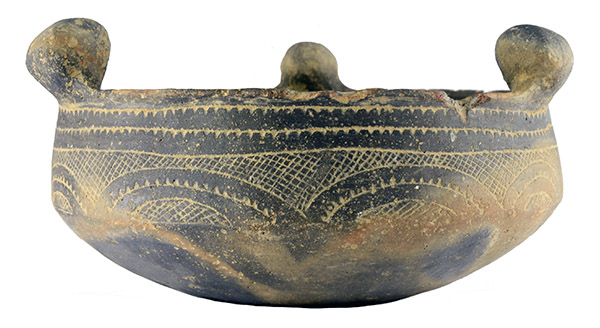
ANCRC Funded Projects. “Preserving and Presenting Arkansas History through Artifacts—Historic Old Washington Site Collection, Historic Washington State Park” is a project funded by a grant from the Arkansas Natural and Cultural Resources Council. With the help of UAF students, ARAS-CO staff member Madelyn Rose is compiling a digital inventory of artifacts excavated from Historic Washington State Park to reconcile multiple excavations performed between 1981 and 2012. The project includes application of the Survey’s new Digital Imaging Lab resources to create 3D models of several diagnostic artifacts, along with development of educational outreach materials for Historic Washington State Park, located near Hope in Hempstead County.
Public Interface for the Hodges Collection. The “JEC Hodges Collection Study” was supported by funding from several sources and completed in fall 2020. Mary Beth Trubitt and Tommie Cotton (ARAS-HSU) collaborated with ARAS-CO staff members Teka McGlothlin and Sarah Shepard, and HSU students and staff, to create an extensive open storage exhibit for many of the 38,000 ceramic vessels and stone tools comprising the Joint Educational Consortium’s Hodges Collection. These materials, from Clark and Hot Spring counties, reflect the long developmental history of the Caddo Indians. The display, which includes an interactive website and 3D models of dozens of artifacts, is open for viewing at the Caddo Center on the HSU campus. The project website, developed with Deborah Weddle (ARAS-CSP) and humanities scholars Judith Stewart-Abernathy and Tamara Francis, launched in December.
Staff News
Dr. George Sabo III, Director of the Arkansas Archeological Survey since 2013, and Archaeologist at the ARAS-UAF research station from 1979-2013, retired at the end of June 2021.
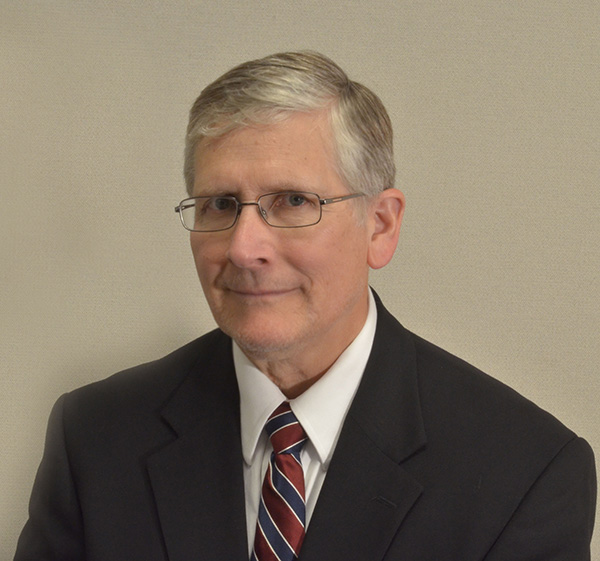
Deborah Sabo (ARAS-CO) retired from her position as Publications Editor at the end of June 2021 after 22 years at the Survey.
Taylor Greene (ARAS-SAU) was hired at the end of the fiscal year 2020–2021 as the new Research Assistant at ARAS-SAU research station. He took up his post on July 1, 2021.
Dr. Matthew Rooney (ARAS-UAM) was hired at the end of the fiscal year and started as the new Station Archaeologist for the ARAS-UAM research station on July 1, 2021.
Dr. John Samuelsen (ARAS-CSP) was promoted to Science and Technology Administrator (Assistant Archaeologist).
Dr. Paige Ford (ARAS-Toltec) was hired at the end of the fiscal year as the new Station Archaeologist for the Toltec Mounds research station. She succeeds Dr. Elizabeth Horton.
Dr. Carl Drexler (ARAS-SAU) was promoted to Research Associate Professor.
Dr. Mel Zabecki (ARAS-CO) was hired as State Archaeologist, replacing Dr. Ann Early, who retired in FY2020. Zabecki had been the Survey’s Educational Outreach Coordinator since 2018.
Dr. Michelle Rathgaber (ARAS-CO) started as the Educational Outreach Coordinator in April 2021. Rathgaber was previously the Archaeological Assistant at Parkin Research Station.
Madelyn Rose (ARAS-CO) was promoted to Collections Technician in May 2021.
Dr. Jodi Barnes (ARAS-UAM) left the Survey to pursue new endeavors in South Carolina. Barnes joined the Survey in 2013 as Station Archaeologist at ARAS-Monticello and contributed research and public archaeology work on African diaspora, Japanese internment camps, and gender and health in historic Arkansas.
Sarah Shepard (ARAS-CO) was promoted to ARAS NAGPRA Coordinator.
Contributions to Higher Education in Arkansas 2020–2021
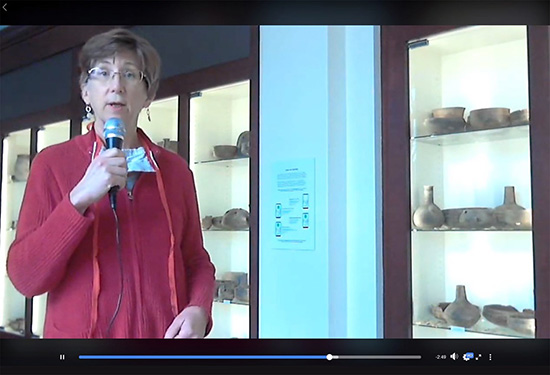
George Sabo III, Survey Director since 2013 and Professor of Anthropology, served as Co-Director of the Environmental Dynamics Interdisciplinary PhD Program, which is part of The Graduate School and International Education at the University of Arkansas.
ARAS archaeologists held research faculty titles in the Department of Anthropology at the University of Arkansas in 2020–2021: Jodi Barnes, Emily Beahm, Andrew Beaupré, Carl Drexler, Jessica Kowalski, Jami Lockhart, Jeffrey Mitchem, Juliet Morrow, and Mary Beth Trubitt.
ARAS archaeologists taught 17 courses for 373 students enrolled at university campuses in Arkansas: UAF, UAFS, UALR, UAM, UAPB, ASU, HSU, and SAU. This included four online courses for University of Arkansas and Arkansas State University – Midsouth, and four students in Independent Studies classes or Internships at UAF, UALR, ASU, and HSU.
Courses taught by Survey archeologists fulfill basic education requirements and contribute to several undergraduate majors and graduate degree programs at Arkansas universities, including Anthropology, History, Geosciences, and Environmental Dynamics at UAF; Heritage Studies at ASU; the Historic Interpretation Program at UAFS; and African Studies at UAPB.
ARAS archaeologists contributed numerous guest lectures, demonstrations of geophysical technologies, field and lab instruction including mapping, ethnobotanical, and other specialized processing, and tours of facilities for college and university students in Arkansas.
ARAS archaeologists supervised five student interns: Andrew Beaupré and Robert Scott (ARAS-UAPB) worked with UALR student Kevin Latting on an independent reading course centered on Arkanasas archaeology; Emily Beahm (ARAS-WRI) supervised Owen Knox, an undergraduate intern from UAF; Juliet Morrow and Sarah Stuckey (ARAS-ASU) supervised ASU student interns Bobby Perry and Dalton Holder; Mary Beth Trubitt and Tommie Cotton (ARAS-HSU) supervised Christine Bostian, a Museum Studies intern at HSU.
ARAS archaeologists filled 5 master’s or doctoral degree committee positions (as member or chair) for graduate students in Anthropology (UAF, UALR) and Environmental Dynamics (UAF), and 1 master’s committee for a University of Oklahoma student.
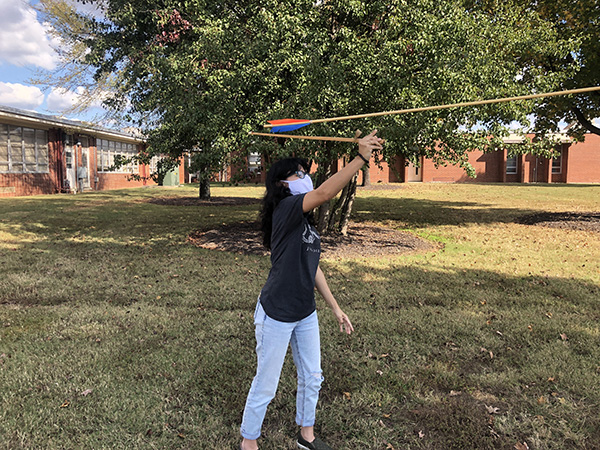
Prior to (and in accordance with) pandemic restrictions, ARAS archaeologists at all research stations and the coordinating office provided opportunities for hands-on research experience in archaeological fieldwork and laboratory analysis for undergraduate and graduate students at host campuses.
ARAS provides employment to students, when possible, at several campuses through grant funding, assistantships, and direct employment.
Additional service to Arkansas college and university campuses includes participation in course and program development for host departments; membership on campus and departmental committees; curatorial functions and exhibit development for campus museums and libraries; and assistance with historic properties and artifact collections owned or managed by the universities. These are the Joint Educational Consortium’s Hodges Collection (HSU); Lakeport Plantation (ASU); Drennen-Scott Historic Site (UAFS); Willhaf House (UAFS); Camp Monticello (UAM); the Taylor House/Hollywood Plantation (UAM); development of SAU Museum; ongoing UA Museum Collections research and on-campus exhibit development (UAF); the Gregoire and other collections at Arkansas Tech Museum (ATU).
Graduate Student Research
The Arkansas Archeological Survey supports graduate students working on internship, thesis, and dissertation projects both at the coordinating office and at our research stations. Support is provided through employment when available, and for assistantships paid out of our base funding and through grants or other special project funds. We also work closely with the Anthropology Department and the J. William Fulbright College of Arts and Sciences at the University of Arkansas to host students who receive support through the Hester A. Davis Internship in Public Archeology and the Charles R. McGimsey III Endowment for Cultural Resource Management. Our graduate students work on a wide variety of research, preservation, and educational initiatives and thus make valuable contributions to our mission within the University of Arkansas System.
-
Noelle King is a graduate student in archaeology in the Anthropology Department at the University of Arkansas Fayetteville. Her advisor is Dr. Jessica Kowalski (ARAS-UAF and UAF Department of Anthropology). After completing her undergraduate degree in Jonesboro, King has spent the past two years working for the Arkansas Historic Preservation Program at the Jacob Wolf House Historic Site as a cultural and historic interpreter. With her background in regional history, Noelle plans to focus her research on historic Ozark archeology, including vernacular log structures and implementation of GIS techniques.
-
Gillian (Steeno) Bjornen is a current master’s student in Anthropology who has lived all over the Midwest but currently calls Detroit, Michigan home. She graduated from the University of Mississippi-Ole Miss with Honors in May 2021 with a bachelor’s degree in Anthropology and Psychology. Her undergraduate thesis research focused on lithic analysis and domestic versus public space at a Late Mississippian/Early Contact site near Starkville, Mississippi. Her current research interests are in Contact and Historic Period Archaeology in the Southeast, but she doesn’t have a specific focus just yet.
Contributions to Public Schools and K-12 Education 2020-2021
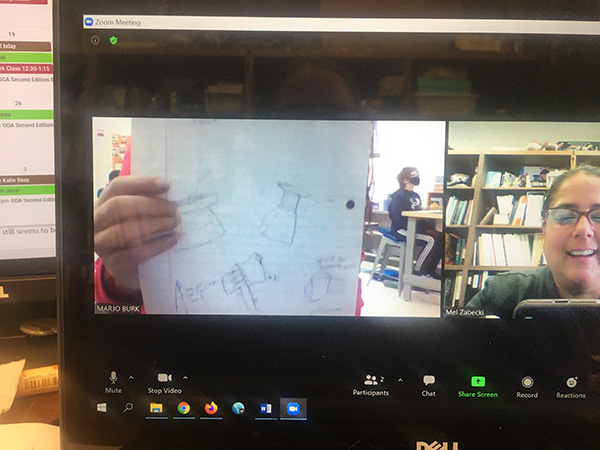
Gathering, Gardening & Agriculture – 5th Grade Social Sciences Curriculum. With funding from the Southeastern Archaeological Conference, the Arkansas Archeological Society, the Arkansas Humanities Council, and the National Endowment for the Humanities, Jodi Barnes (ARAS-UAM), Emily Beahm (ARAS-WRI), and Elizabeth Horton (ARAS research affiliate) developed a 5th grade social sciences curriculum that is now available as free downloads on the ARAS website. The lesson and instruction package is aligned with the 5th grade Arkansas Department of Education (ADE) Social Studies Curriculum Framework. It presents the history of early Arkansas by comparing foodways of Native Americans, European settlers, and African Americans. Archaeological evidence from Arkansas is used to illustrate and to show how science can explore these topics. Complete lesson plans, exercises, and PowerPoints are on the website, along with background information for teachers. The Survey also offers teacher workshops to help educators implement the curriculum. A hardcopy workbook is available to Arkansas educators on request.
Teacher Workshops. ARAS Educational Outreach Coordinator Mel Zabecki offered teacher workshops at Educational Cooperatives in Beebe, Monticello, and Plumerville with 33 teachers earning professional development credits. Local station archaeologists were invited via Zoom to talk to teachers about the archaeology of their respective areas and how and where teachers and students can visit archaeological parks and museums.
Classroom Materials. We offer a series of educational fliers on many topics available as downloadable PDFs that can be used for teacher preparation or as classroom handouts.
School Visits, Programs & Tours. Survey archaeologists typically give talks and demonstrations on archaeology, American Indians, and early Arkansas history throughout the year. During 2020–2021, ARAS staff adapted to Covid-19 restrictions by shifting to virtual classroom visits, demonstrations, and tours. Mel Zabecki (ARAS-CO) participated in 8 virtual classroom visits, reaching 83 students, and held 2 Skype-A-Scientist sessions, reaching 32 students. Tim Mulvihill (ARAS-UAFS) gave two online presentations on Ozark prehistory to Ozark High School US History classes (39 students), Michelle Rathgaber (ARAS-CO) gave a talk on “Native American Dwellings” to gifted and talented students at Farmington Elementary School (16 students), and Tommie Cotton (ARAS-HSU) exchanged letters with a student in the “Letters to a Pre-Scientist” program. When in-person events resumed, Rathgaber (ARAS-CO) hosted an informational booth at Greenland Middle School’s Career Day, reaching approximately 150 middle school students and their teachers and Emily Beahm (ARAS-WRI) gave a presentation to 25 children and their parents for the Camp Trinity Home School Series- Archaeology Day.
Native American Days 2020. Mel Zabecki (ARAS-CO) worked with the Shiloh Museum of Ozark History to organize the event for fifth graders and anyone else interested in Native American history. Over 2,110 students and their teachers from across the state and as far as West Virginia participated. Survey archaeologists, as well as Tribal representatives, State Parks Interpreters, and living historians gave presentations about archaeology and Native American life.
Engineering & Archaeology Day Camp. Zabecki worked with Amy Warren (UA Engineering Department to develop a pilot 5-day camp in Fayetteville for 7th and 8th grade girls, with hands-on learning that combines archaeology and engineering.
Youth Organizations. Zabecki (ARAS-CO) hosted a local Girl Scouts troop (8 students) for a day. Andrew Beaupré (ARAS-UAPB) served as the archaeologist of record for a 4-H Project Archaeology event in Perry County (15 students). In June, Beaupré (ARAS-UAPB) taught the Boy Scouts Archaeology Merit Badge to 38 students at the Gus Blass Scout Reservation in Damascus, Arkansas; he continued to administer the badge online through YouTube videos and email with additional scouts in multiple states.
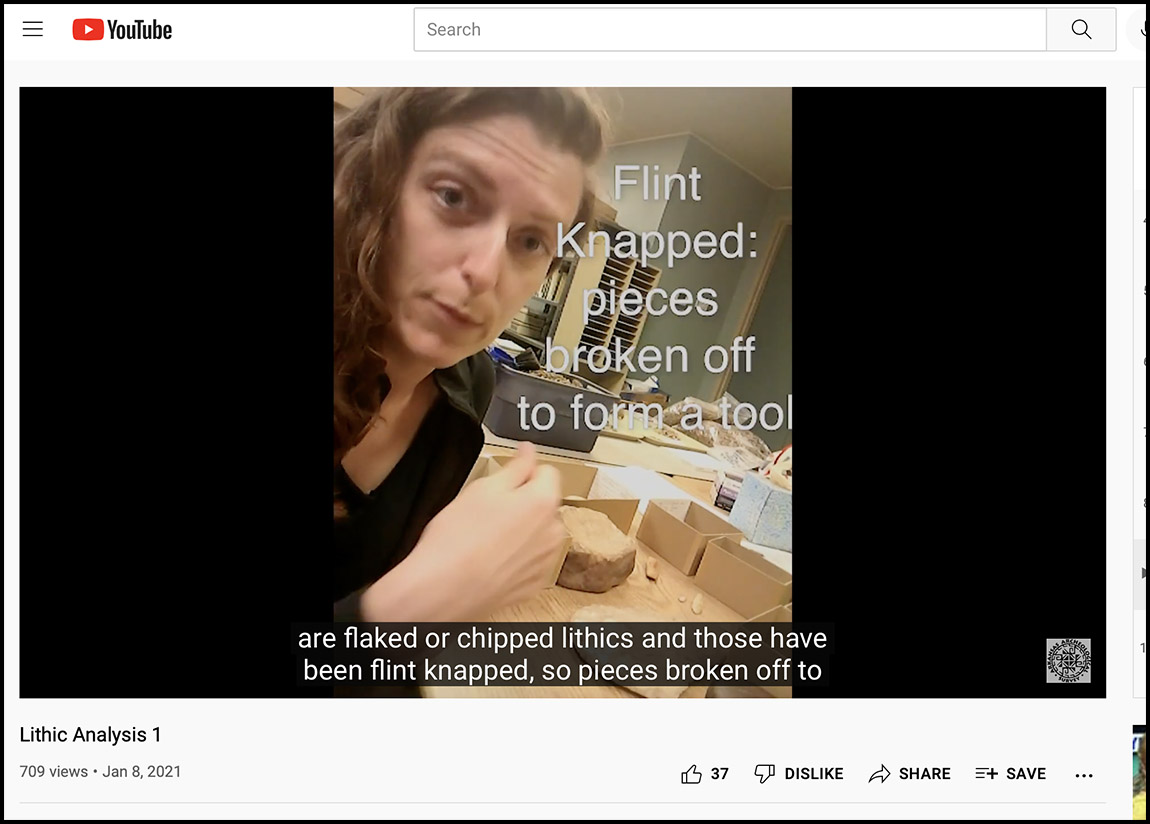
Public Service and Outreach 2020–2021
Zooming Forward: Public Education in the Time of Covid. ARAS did not abandon its public education efforts in the face of Covid. Our staff continued to adopt strategies for virtual presentations and events in 2020-2021. For example, a series of short educational videos presented via Facebook and collected as a playlist called Lab Work on the Survey’s YouTube channel was developed by Michelle Rathgaber (ARAS-Parkin). Mel Zabecki (ARAS-CO) participated in the Archaeological Institute of America’s Tweet-a-thon for International Archaeology Day by posting about various archaeological topics and sharing photos of artifacts and tools on Twitter. Mary Beth Trubitt (ARAS-HSU) gave a tour of the Caddo Center and the JEC Hodges Collection for Arkansas Archaeology Month via Facebook Live.
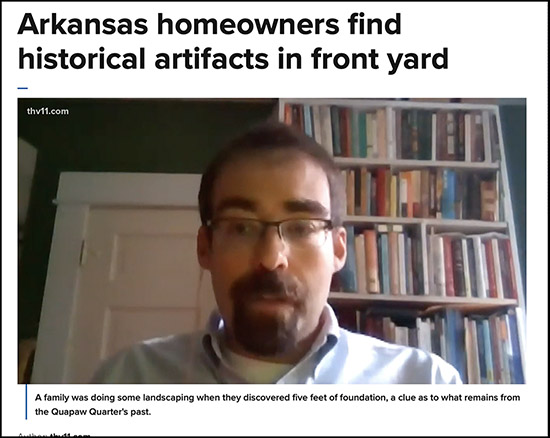 Survey Staff in the News. Several Survey archaeologists were featured in local news and media this year. Andrew Beaupré (ARAS-UAPB) was interviewed by Channel 11 about archaeology in the backyards of Little Rock. ARAS-UAF’s Jessica Kowalski and Michael Evans, and Mel Zabecki (ARAS-CO) were interviewed on the Arkansas Post Podcast for a piece called “Archaeology in Arkansas.” Michael Evans (ARAS-UAF) was also interviewed by Phil Gast for a 2021 update for the “Civil War Picket,” a historical blog. Marilyn Knapp and Mel Zabecki (ARAS-CO) were interviewed about Archaeology Month by GoodDayNWA. Knapp was also interviewed by local NPR station, KUAF, about the Arkansas Archeological Society.
Survey Staff in the News. Several Survey archaeologists were featured in local news and media this year. Andrew Beaupré (ARAS-UAPB) was interviewed by Channel 11 about archaeology in the backyards of Little Rock. ARAS-UAF’s Jessica Kowalski and Michael Evans, and Mel Zabecki (ARAS-CO) were interviewed on the Arkansas Post Podcast for a piece called “Archaeology in Arkansas.” Michael Evans (ARAS-UAF) was also interviewed by Phil Gast for a 2021 update for the “Civil War Picket,” a historical blog. Marilyn Knapp and Mel Zabecki (ARAS-CO) were interviewed about Archaeology Month by GoodDayNWA. Knapp was also interviewed by local NPR station, KUAF, about the Arkansas Archeological Society.
NAGPRA Documentation. We continued our NAGPRA compliance program in cooperation with several American Indian Tribes. Under the federal Native American Graves Protection and Repatriation Act (NAGPRA), many institutions and agencies are obligated to provide an inventory of all items in their collections that are subject to repatriation. Such items are human remains, funerary objects, sacred artifacts, and items of cultural patrimony. This is done by researching and providing a summary of all existing records for each artifact collection to establish the geographical origin, cultural affiliation, and other basic information about how the items were acquired and accessioned. The remains and objects may then be repatriated to modern representatives of the appropriate culturally affiliated American Indian Tribe. The Survey’s activities are essential for compliance with this federal law. We also curate, under contract, collections owned by various government entities that are subject to NAGPRA.
-
As of 2019 ARAS has completed the steps necessary to be substantially in compliance with our NAGPRA obligations for collections that we currently curate. This process took several years, and was overseen by the ARAS registrar’s office, with Sarah Shepard in charge.
-
This year the Summary for Unassociated Funerary Objects from Lake Dumond Site was submitted to the National Park Service NAGPRA Office and Quapaw Nation for repatriation, a collection was transferred back to the Arkansas State Medical Examiner, and the office worked with Mel Zabecki (ARAS State Archaeologist) to document remains and file all SOD paperwork relating to burials.
-
Registrar staff also assisted several outside agencies with NAGPRA compliance and information: Arkansas Department of Transportation, Arkansas State Parks, University of Arkansas Department of Anthropology, US Army Corps of Engineers, University of Arkansas Museum, and the US Forest Service.
State and Federal Agencies. The Survey works closely with state and federal agencies whose responsibilities under environmental and cultural preservation statutes include the management and protection of archaeological sites:
-
Department of Arkansas Heritage and the Arkansas Historic Preservation Program; Arkansas Department of Transportation; Arkansas Department of Parks and Tourism/Arkansas State Parks; Arkansas Game and Fish Commission; National Park Service; USDA Forest Service; US Natural Resources Conservation Service; US Army Corps of Engineers; and US Fish and Wildlife Service.
Training Program & Field School. Sadly, the annual Training Program was canceled this year due to the Covid-19 pandemic. If all goes well, the plans made for 2021 will be implemented instead in 2022.
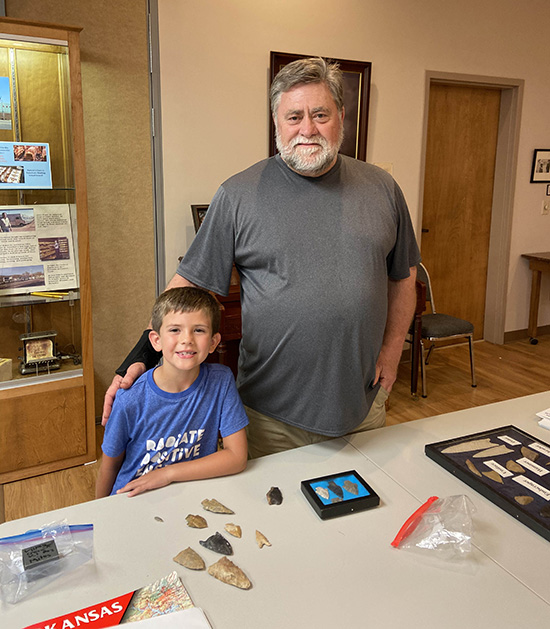
Public Programs & Presentations. Survey staff normally give dozens of public talks and set up information booths at community events that reach several thousand listeners and visitors each year. In 2020–2021, the Covid-19 pandemic threatened this outreach mission. Nevertheless, our staff gave at least 44 public lectures, workshops, tours, information booths, and other presentations reaching audiences of over 2,812 Arkansans and people in neighboring states. An additional 10 public talks to chapters of the Arkansas Archeological Society reached combined audiences of about 210. Most of these were free virtual events via Zoom.
Historic Cemeteries. Kathleen Cande (ARAS-CO) coordinates Survey research, assistance, and advice with groups and individuals working on projects to document and protect historic cemeteries, especially African American cemeteries. ARAS staff assisted several volunteer groups with cleaning and documenting cemeteries, or helped investigate locations of unmarked but suspected gravesites, including at East Mountain Cemetery.
Encyclopedia of Arkansas. Survey staff have so far contributed about 60 articles and reviewed many others for the CALS online Encyclopedia of Arkansas.
Public Contacts. Survey staff members respond to thousands of requests for information from members of the public every year, by telephone, email, social media, and in person.
Exhibits & Museums. Survey staff have created or assisted with several exhibits around the state:
-
Mary Beth Trubitt and Tommie Cotton (ARAS-HSU) curate the JEC’s Hodges Collection of Native American Artifacts at the HSU Caddo Center. When the Caddo Center reopened to the public in October, ARAS-HSU staff and student intern Christine Bostian gave tours to a total of 140 visitors. The new Hodges Collection website, designed with the help of Deborah Weddle (ARAS-CSP), launched in December, and features short videos and 3D models developed by Trubitt and Bostian. Grants from Arkansas Archeological Society and the Arkansas Humanities Council helped fund the project
-
ARAS-HSU station staff maintain displays using Hodges collection artifacts at the HSU Huie Library, the OBU Hickingbotham Library, and the Clark County Historical Association Museum in Arkadelphia.
-
George Sabo was curator for a permanent exhibit on “Arkansas Native Americans” installed at the Arkansas Union on the UAF campus.
-
Katy Gregory (ARAS-Toltec) worked with park interpreters at Toltec Mounds Archeological State Park to create a new temporary exhibit highlighting the steps of processing artifacts once they arrive in the lab. The exhibit encourages visitors to find examples of the different archaeological processes in the museum’s permanent exhibit. Gregory and the park’s interpreters also collaborated on a new display by the Plum Bayou Garden that emphasizes the importance of pollinators.
-
Michelle Rathgaber (ARAS-Parkin) and Rachel Lewis (Parkin Archeological State Park interpreter) organized a photographic exhibit about the Sawdust Hill Community for the Parkin Archeological State Park for Black History Month in February.
-
Other assistance for exhibit development, collections, or programs at museums was provided to Smithsonian Museum of Natural History; Parkin and Toltec Mounds State Parks Visitors Centers; Historic Cane Hill Museum, The Gilcrease Museum; Old Independence Regional Museum, Shiloh Museum of Ozark History; University of Arkansas Museum Collections; and National Cowboy and Western Heritage Museum in Oklahoma City.
Website and Social Media. Our website, designed and maintained by our own Computer Services Program staff (Deborah Weddle and John Samuelsen), offers a modern, graphic home page that is easy to navigate, with rotating content that emphasizes interesting information about archaeological research and discoveries in Arkansas, and educational materials for public and schoolroom use. We also maintain topical websites for the general public and fellow scholars.
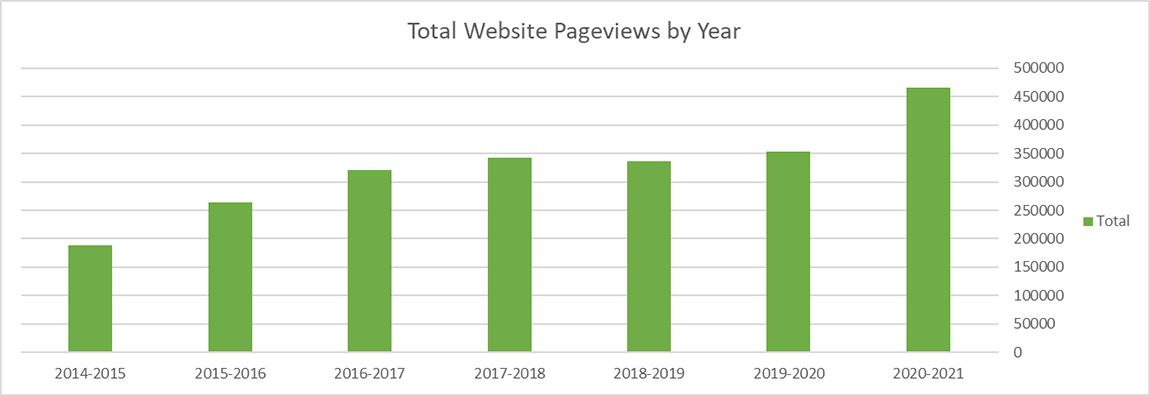
-
Visitor traffic to the main ARAS website increased by about 65% in FY21, with 208,883 pageviews by 30,071 users over 43,577 sessions. For all our websites combined, traffic reached 460,000 pageviews.
-
The new website for the Joint Educational Consortium’s Hodges Collection went live in December 2020. It was developed by Mary Beth Trubitt (ARAS-HSU) with technical assistance from Deborah Weddle (ARAS-CSP).
-
Emily Beahm (ARAS-WRI) is working on an updated redesign of our Rock Art in Arkansas website, also with Weddle’s help. The new websites should be ready to launch next year.
-
A popular continuing feature on the website is our Artifact of the Month series, now in its fourth year. These brief illustrated stories tell visitors about Arkansas’s prehistoric and historic heritage, and how we learn about the past, one artifact at a time.
-
AMASDA Online provides password-protected, web-based access to our archaeological site database for qualified researchers. Contractors pay a fee per project or by annual subscription. The new online eCommerce site enables a more streamlined process for contractors to access their accounts. More information is in this Annual Report in the registrar’s office section and the computer services section. AMASDA Online had 104,630 pageviews in 2020–21. There were 91 paid-per-project and 8 annual subscriptions.
-
ARAS continues to increase the use of social media to provide information about Arkansas archaeology, our projects and discoveries, and local volunteer opportunities. Our Educational Outreach Coordinator manages the social media administrative functions for the main accounts. Each research station also has its own Facebook page. This year, during Covid-19, we used social media to provide informative short videos as virtual “lab sessions” and talks.
Boards and Commissions. ARAS staff served on a number of Boards and Commissions in Arkansas and beyond:
-
Emily Beahm (ARAS-WRI) and Andrew Beaupré (ARAS-UAPB): State Review Board for the National Register of Historic Places.
-
Kathleen Cande (ARAS-SRP): Board of Directors, Recording Secretary, Washington County Historical Society; Board of Trustees, Arkansas Historical Association.
-
Carl Drexler (ARAS-SAU): Board of Trustees, Arkansas Historical Association.
-
Jami Lockhart (ARAS-CSP): Northwest Arkansas Open Space Plan Steering Committee, planning committee for the Fayetteville Riverine Commons at the Watershed Conservation Resource Center.
-
Jeffrey Mitchem (ARAS-Parkin): Advisory Board, Alliance for Weedon Island Archaeological Research and Education, St. Petersburg, Florida; Director-at-Large, Florida Public Archaeology Network.
-
Michelle Rathgaber (ARAS-CO): Board member, Cross County Historical Society.
-
Deborah Sabo (as Newsletter Editor), Marilyn Knapp (ex officio), and Melissa Zabecki (ex officio) (all ARAS-CO): Executive Committee of the Arkansas Archeological Society.
-
Deborah Weddle (ARAS-CSP): Board of Directors, Fan Association of North America.
-
Melissa Zabecki (ARAS-CO): Board member, REACH committee, and Programs committee of the Arkansas Humanities Council; State Coordinator for Arkansas, Project Dig.
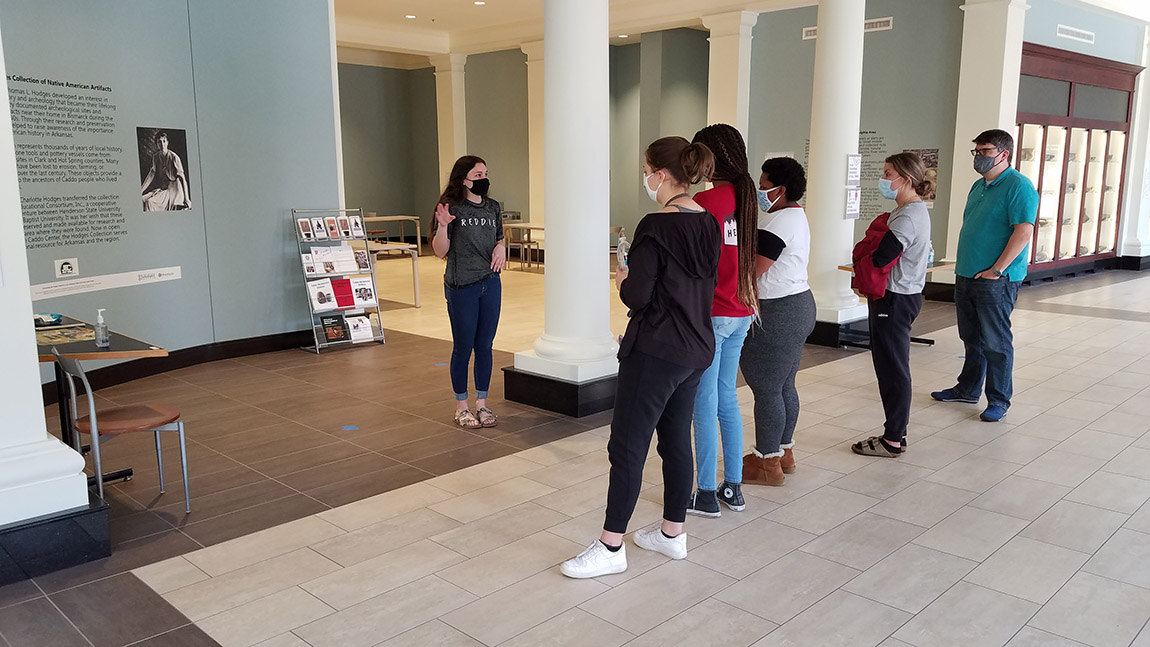
Professional Service 2020-2021
ARAS staff provided expert advice or other assistance to over 150 agencies, firms, museums, schools, parks, civic groups, and other bodies, in addition to service rendered to research station host institutions.
Jeffrey Mitchem (ARAS-Parkin) sits on the Board of Directors of The Archaeological Conservancy. Mitchem has served the organization for many years as a tour leader and lecturer, and (along with other ARAS archeologists) has partnered to assist the Conservancy’s mission of investigating sites that may be protected through acquisition, and helping to negotiate this process. The Parkin site, now preserved within Parkin Archeological State Park, was acquired by the Conservancy and donated to the State of Arkansas for this purpose. Over 500 important archeological sites have so far been saved by the Conservancy.
Several Survey archaeologists serve as editors or members of editorial boards for professional organizations and journals.
-
Jodi Barnes serves as associate editor of the journal Historical Archaeology.
-
Emily Beahm serves as a member of the editorial board of the journal Southeastern Archaeology and as newsletter editor for the Southeastern Archaeological Conference.
-
Andrew Beaupré is Vermont news editor for the Council of Northeast Historical Archaeology Newsletter.
-
Kathleen Cande serves as Gulf States current research editor for the Society for Historical Archaeology Newsletter.
-
Jeffrey Mitchem is on the editorial board for the journal The Florida Anthropologist.
-
Deborah Sabo is the editor of Field Notes, the newsletter of the Arkansas Archeological Society.
-
George Sabo serves on the editorial board of the Caddo Archeology Journal.
-
Mary Beth Trubitt serves as editor of the journal Southeastern Archaeology and Caddo Archeology Journal.
Multiple ARAS staff members served as officers, members of various committees, or in other service capacities for these professional organizations:
-
National Endowment for the Humanities
-
Society for American Archaeology
-
Society for Historical Archaeology
-
Caddo Conference Organization
-
Southeastern Archaeological Conference
-
Society for Black Archaeologists
-
The Archaeological Conservancy
-
Florida Anthropological Society
-
Arkansas Historical Association
-
Society of Bead Researchers
-
Florida Archaeological Council
-
Friends of the Arkansas State Archives
-
National Association of State Archaeologists
-
National Association for Interpretation
-
Washington County Historical Society

